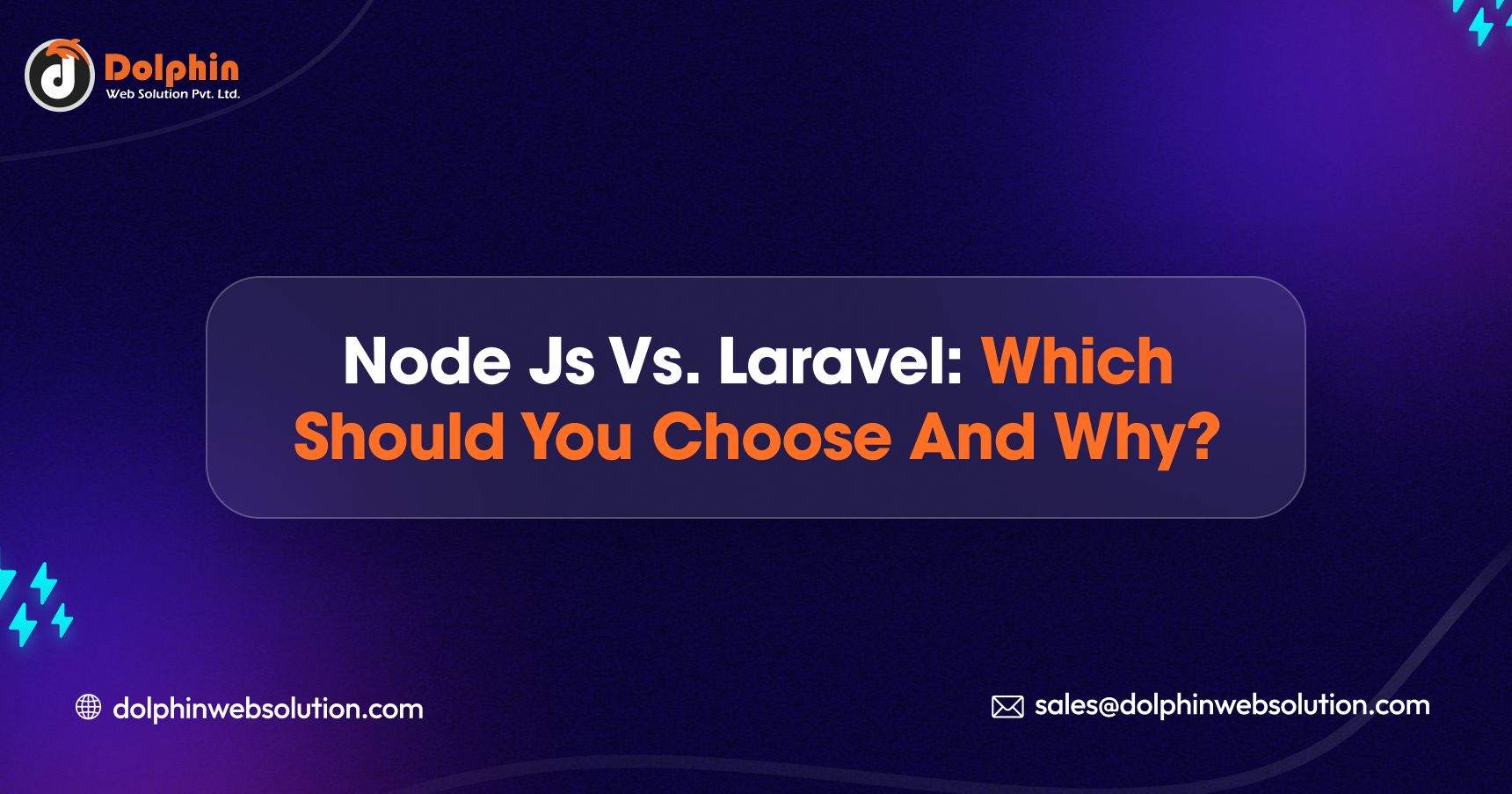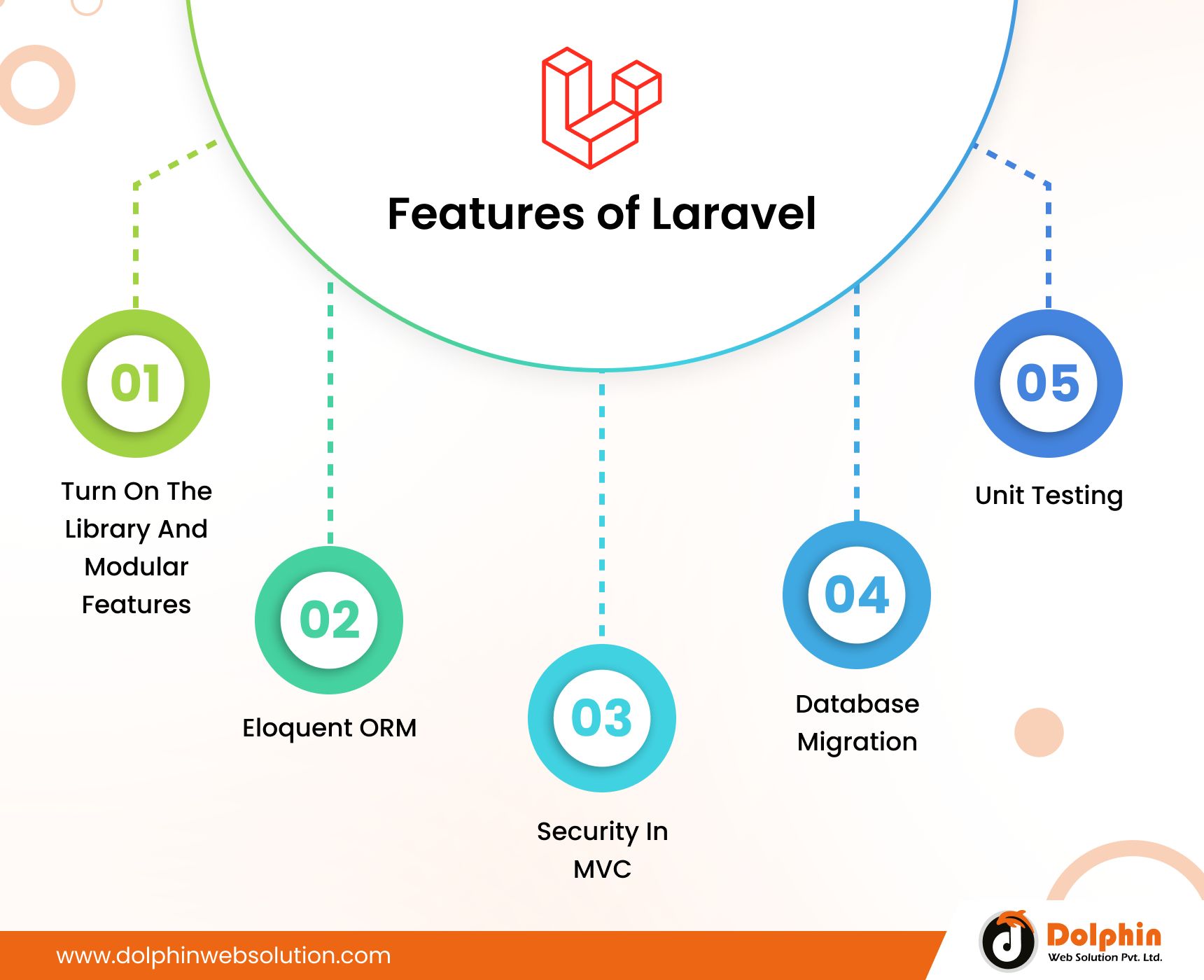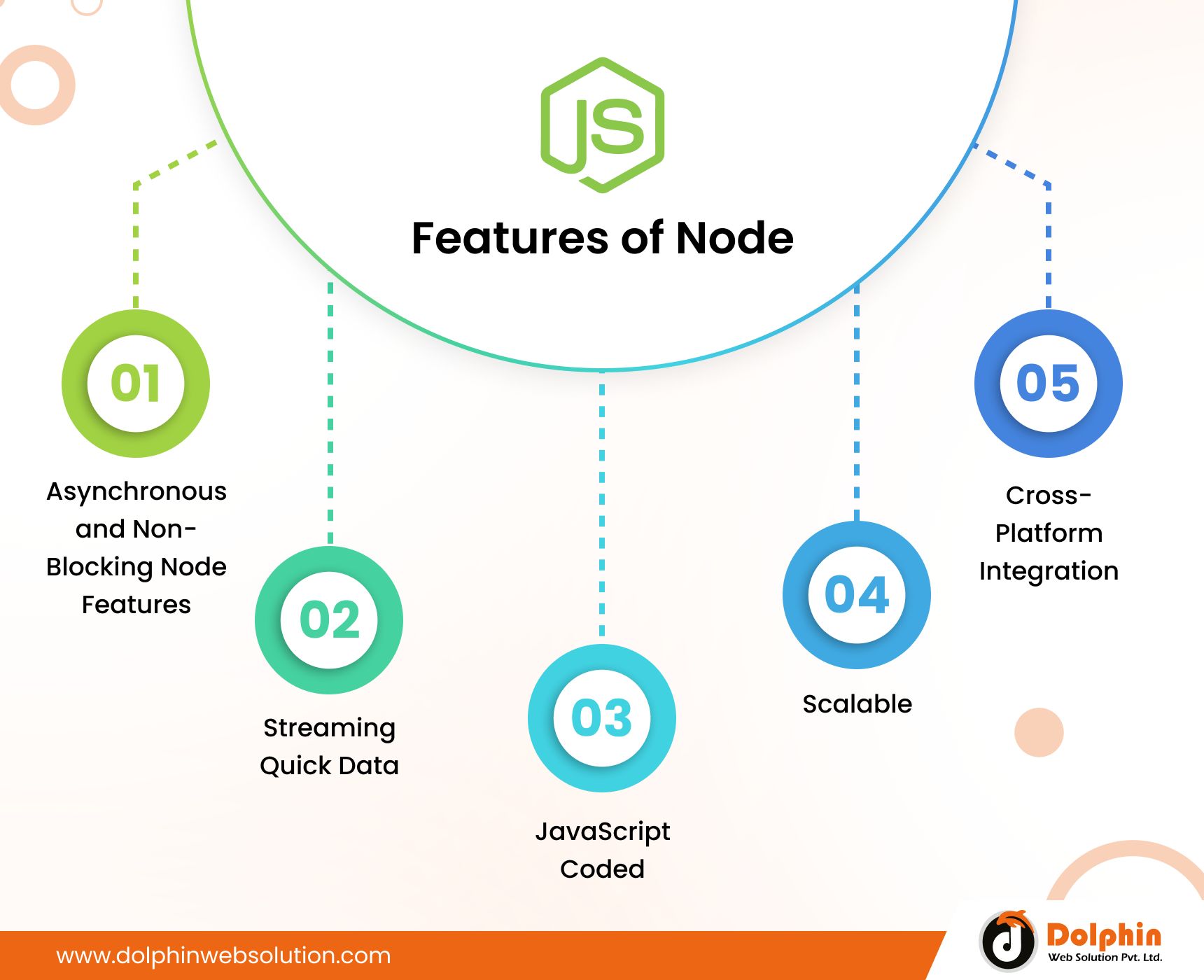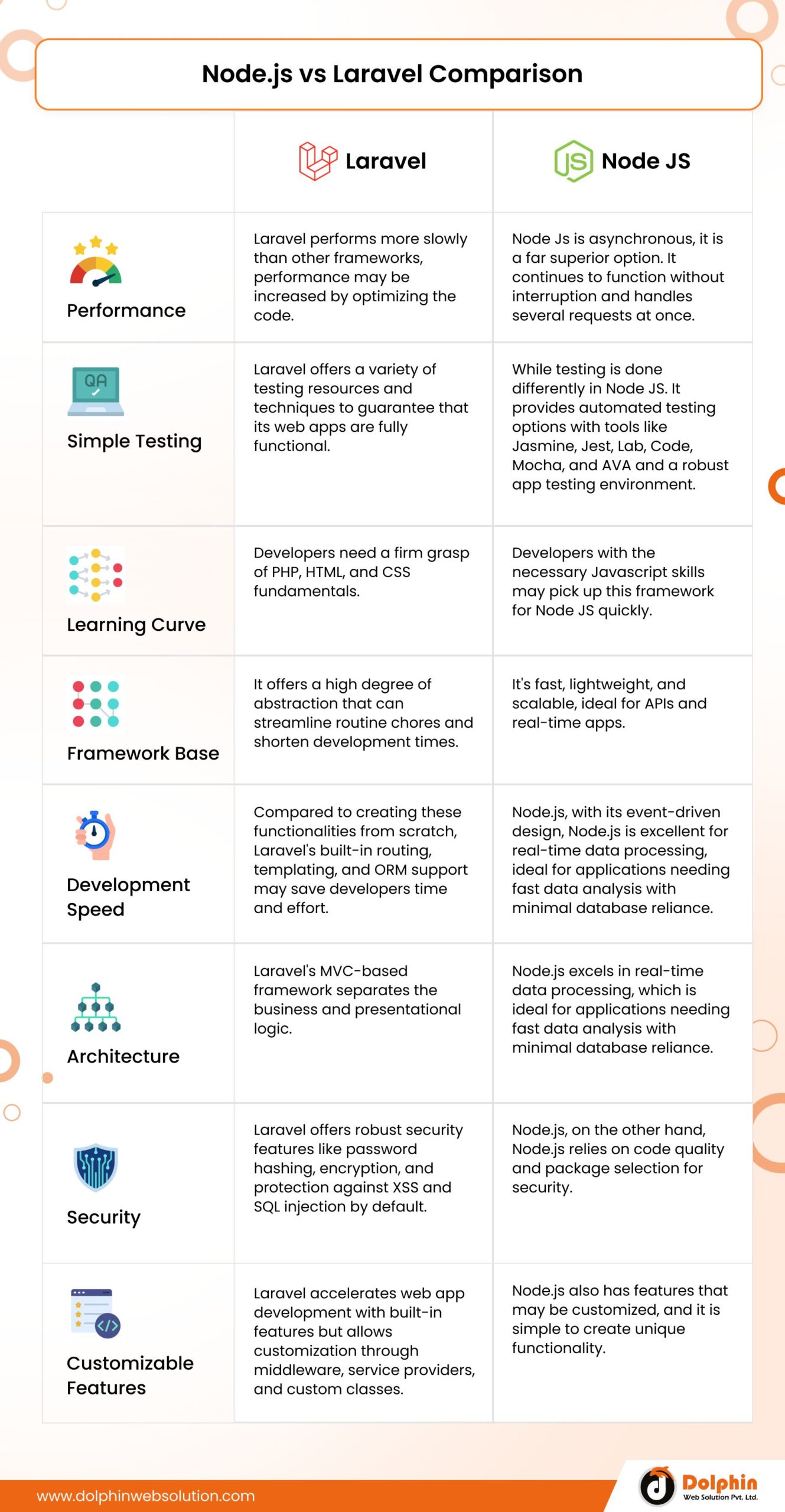Node Js vs. Laravel: Which Should You Choose and Why?

Table of Contents
Summary :
Explore our latest blog for insights on the Node.js vs. Laravel showdown, diving into the ultimate conflict between these two powerful development technologies."We lay down each technology's advantages and disadvantages to assist you in selecting the best option for your upcoming web development project. Examine the essential criteria to help you decide between these two potent frameworks.
Introduction
The success of your projects depends heavily on your choice of technology stack in the constantly changing world of web development. Node.js and Laravel are two of the most well-liked and reliable options in this field of website development, each having unique advantages and applications. We aimed to demystify this essential decision-making process in our thorough investigation of “Node.js vs. Laravel: Which Should You Choose and Why?”
Node.js employs over 6.3 million websites, making it the most popular web development technology in the country. For the creation of apps, prominent Node JS frameworks, libraries, tools, and IDEs are preferred by 36.42% of professional developers. The average age of Node JS developers was between 25 and 35, or 46%. Amazon, LinkedIn, Tumblr, Netflix, and PayPal are examples of well-known websites created with Node.js.
According to BuiltWith 1,723,068 active and archived websites use Laravel. Seven hundred forty-three thousand four hundred seventy live websites utilize Laravel, which powers over 33.7 million active websites. Meanwhile, 979,598 formerly Laravel-powered websites have stopped using the platform or switched to rivals. Out of the top 5, Laravel is the most competitive company. According to SimilarTech, its market share will be 35.87%. In this latest blog let’s look at the difference between Laravel and Node.js.
What Is Laravel?
Laravel is a PHP framework for creating cross-platform web applications. Laravel’s Artisan command-line tool automates programming tasks, including database setup and management, MVC file creation, asset interaction, custom command development, and streamlining development processes. Laravel-based applications are easy to maintain and have scalable codebases. The robust dependency management and adaptable packaging mechanism of Laravel make it simple for developers to add functionality to their projects.
Features of Laravel

1. Turn On The Library And Modular Features
Laravel stands out with pre-installed Object-Oriented and Modular libraries, a rarity in PHP frameworks. Its Authentication library simplifies tasks like encryption, password reset, Bcrypt hashing, user verification, and CSRF protection, making development more efficient and secure. A responsive and modular web application may be created using this framework’s independent modules, partitioned into separate parts utilizing cutting-edge PHP techniques.
Blade is a template engine that is a component of Laravel. The blade offers easy shortcuts for popular tasks like presenting data, creating forms, and paginating data, as well as the possibility of inserting straightforward PHP code in your views.
2. Eloquent ORM
An element of Laravel that contains a simple PHP Active Record implementation is called Eloquent Object Relational Mapping (ORM). Thanks to this capability, web application developers may now create database queries using PHP syntax rather than SQL code. In comparison to older PHP frameworks, ORM is quicker.
3. Security In MVC
The Model-View-Controller (MVC) architectural design, which is extensively used in online application development, prioritizes security. The Model (data and business logic), the View (user interface), and the Controller (handles user input and manages interactions between the Model and View) are the three distinct components of an MVC application. At each tier, security measures should be incorporated. To prevent SQL injection, XSS (Cross-Site Scripting), and other vulnerabilities, developers must ensure that data in the Model is checked and sanitized. Views should be built to prevent UI-based assaults, while controllers should enforce authentication and authorisation to restrict access to sensitive capabilities. Developers can design robust and secure web apps that safeguard user data and avoid potential threats by following security practices at every level of the MVC framework.
4. Database Migration
In web development, database migration is a critical part of database management. It is the process of changing or modifying the schema, structure, or data of a database while maintaining existing data integrity. Developers may version control database changes through database migrations, making it easier to collaborate and maintain databases across numerous contexts such as development, testing, and production. Popular web frameworks, such as Laravel, have database migration capabilities, allowing developers to create, amend, or roll back database schema changes with simple code-based commands. Database migrations not only assure database consistency but they also improve application scalability and deployment efficiency, making them an indispensable tool for handling the changing data requirements of modern online applications.
5. Unit Testing
It is an essential component of any online application’s Product Development Life Cycle. Laravel supports unit tests, ensuring code updates are error-free. It integrates with the PHP unit and automates testing, simplifying the process for testers to conduct thorough and hassle-free tests.
What is Node JS?
Node.js, an open-source, cross-platform JavaScript runtime and library, allows server-side execution of web applications independently of the client’s browser. Ryan Dahl created it in 2009. In April 2021, it achieved version 15.14, demonstrating its continued expansion and success in programming. Developers use Node.js to create server-side web applications, and because it uses an asynchronous, event-driven methodology, it is ideal for data-intensive applications.
Features of Node

1. Asynchronous and Non-Blocking Node Feature
Node.js uses a single-threaded model to manage all requests. Its asynchronous processing ensures clients don’t wait for data, enhancing responsiveness. In Node.js, I/O activities continue uninterrupted even while the CPU handles requests, thanks to its non-blocking, asynchronous architecture.
2. Streaming Quick Data
Node.js utilizes the V8 JavaScript runtime environment. Chrome also uses this runtime motor. The hub’s wrapping makes the motor run even quicker than previously. Node.js’s performance thus becomes much faster, enabling a web application to stream data quickly.
3. JavaScript Coded
One of the most popular programming languages now utilized in business is JavaScript. Most web apps are running JavaScript. This facilitates learning NodeJS rapidly for web developers already familiar with JavaScript. Parsing JSON is simplified because it’s JavaScript-native, leveraging the language’s built-in capabilities for effortless handling and manipulation.
4. Scalable
Scalability is another aspect of NodeJS. This indicates that NodeJS can manage several requests at once if necessary. NodeJS’s “single thread event-driven loop” allows it to manage many queries. The cluster module also controls load balancing across all of the available CPUs.
5. Cross-Platform Integration
Node.js excels in cross-platform compatibility, working seamlessly on Windows, Linux, and macOS. It employs a single-threaded event loop, efficiently handling requests as events and promptly processing associated callbacks. This architecture enhances Node.js’ performance across various devices. With several lightweight requests, NodeJS is a very effective runtime because of this cycle of processing requests and subsequent callbacks. This event-driven, non-blocking I/O model also distinguishes Node.js from traditional web servers that use thread-based models like Python. For more on how Node.js compares to Python’s threading approach, see this comparison of Node.js vs Python. With its event-loop model, Node.js can handle thousands of concurrent connections with high throughput, making it well-suited for real-time web applications.
Node.js vs Laravel Comparison

1. Performance
Laravel
Although Laravel performs more slowly than other frameworks, performance may be increased by optimizing the code. Nevertheless, Laravel features a cache tag functionality that enables it to store and load this previously saved data as needed. As a result, the server responds more quickly, and the client sees quicker results.
Node JS
However, because Node Js is asynchronous, it is a far superior option. It continues to function without interruption and handles several requests at once. This shortens reaction times and produces faster outcomes.
2. Simple Testing
Laravel
Laravel offers a variety of testing resources and techniques to guarantee that its web apps are fully functional. These technologies aid developers in producing apps free of bugs. To find flaws in various categories, the tests run in two stages: feature and unit testing. Laravel’s testing tools and procedures are well-documented in its testing documentation.
Node JS
While testing is done differently in Node JS. It provides automated testing options with tools like Jasmine, Jest, Lab, Code, Mocha, and AVA and a robust app testing environment. Contact us right now to get the best web solutions and to dominate your market.
3. Learning Curve
Laravel
To learn Laravel, developers need a firm grasp of PHP, HTML, and CSS fundamentals. Laravel simplifies development with built-in libraries and templates, making it accessible and efficient for developers. But it takes more work to become a Laravel specialist.
Node JS
Developers with the necessary Javascript skills may pick up this framework for Node JS quickly. The architecture is simple to unlock and comprehend for Javascript developers. As a result, Node Js prevails in the learning curve game.
4. Framework Base
Laravel
Laravel is a PHP framework utilizing the MVC architecture. It streamlines development with routing, templating, ORM, security, and performance tools. It aims to empower developers to create dependable and scalable web applications rapidly and efficiently. It offers a high degree of abstraction that can streamline routine chores and shorten development times.
Node JS
Node.js, powered by Google’s V8 engine, is a runtime for server-side JavaScript. It’s fast, lightweight, and scalable, ideal for APIs and real-time apps, enabling HTTP handling, database connectivity, and file operations with JavaScript on the server side.
5. Development Speed
Laravel
Compared to creating these functionalities from scratch, Laravel’s built-in routing, templating, and ORM support may save developers time and effort. In addition, Laravel’s conventions and abstractions can facilitate development and lessen the time and effort needed to create certain features.
Node JS
Contrarily, Node.js is intended for creating real-time, highly concurrent applications and significantly emphasizes performance and scalability. Laravel offers built-in routing, templating, and ORM for web apps. Node.js, with its event-driven design, Node.js is excellent for real-time data processing, ideal for applications needing fast data analysis with minimal database reliance. The choice depends on your project requirements.
6. Architecture
Laravel
Laravel’s MVC-based framework separates the business and presentational logic. Models display information in MVC, views present information, and controllers manage and modify user input and data. Laravel offers built-in routing, templating, and ORM for web apps. Node.js, with its event-driven design,
Node JS
Node.js excels in real-time data processing, which is ideal for applications needing fast data analysis with minimal database reliance.
7. Security
Laravel
Laravel offers robust security features like password hashing, encryption, and protection against XSS and SQL injection by default. It also provides user account safeguards like password resets and email confirmation.
Node JS
Node.js, on the other hand, Node.js relies on code quality and package selection for security. Vulnerable packages can pose risks, and Node.js’ event-driven design can make it susceptible to DoS and other attacks leveraging the event loop.
8. Customizable Features
Laravel
Laravel accelerates web app development with built-in features but allows customization through middleware, service providers, and custom classes. It also offers front-end customization tools like templating, asset management, and styling support. Laravel also has several tools and features, such as its command-line interface (CLI), Artisan, and its package management, Composer, that make maintaining and developing bespoke functionality simpler.
Node JS
Node.js also has features that may be customized, and it is simple to create unique functionality thanks to its modular design and sizable ecosystem of packages and modules.
Which Development Framework To Choose: Laravel vs Node Js?
Laravel and Node.js each have their strengths for web development. Laravel excels at building complex, data-driven web applications with robust back-end logic and strict MVC organization. Its elegant syntax and expansive libraries enable rapid development. Conversely, Node.js thrives for real-time applications like chat platforms where lightweight asynchronous I/O is ideal. With its event-driven, non-blocking model, Node.js can handle high levels of simultaneous interactions efficiently.

Hello!
Click one of our contacts below to chat on WhatsApp


